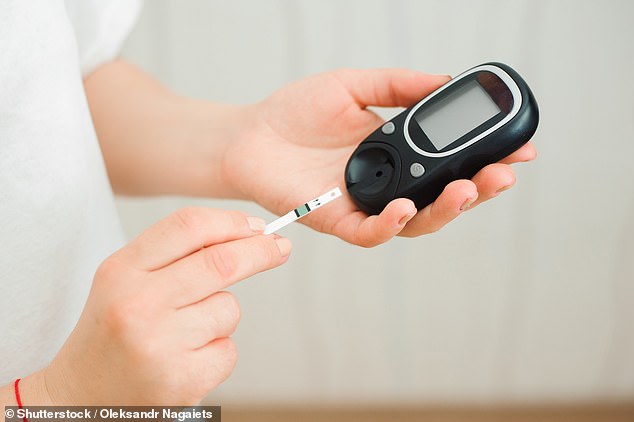- Experts say the link to heart problems may not have been fully understood
Young people with diabetes are at high risk of sudden death, according to a major study.
Danish researchers have found that diabetics are significantly more likely to suffer sudden cardiac death than healthy people of the same age.
Surprisingly, this risk was highest for people aged 30 to 40 with type 1 diabetes (the genetic form of the disease).
This high-risk group is 20 times more likely to die from a heart problem.
People in their 30s with type 2 diabetes (which is linked to being overweight or inactive) were almost six times more likely.
People with diabetes often use blood sugar monitors, like the one pictured here, to determine how much sugar is currently circulating in their bloodstream. This helps them decide what to eat and when to use insulin to better control their disease.
Experts say the findings show it is crucial for young patients with diabetes to be monitored for heart problems.
“These are very exciting results,” says Professor Elijah Behr, a cardiologist at St George’s University of London.
‘Diabetes has long been known to increase the risk of heart disease, but the strength of its effect may not have been fully understood.
“This won’t necessarily change the way we treat people at the moment, but it does show that patients with diabetes need to be monitored much more closely, especially as they may be at risk for other, more common comorbidities.”
Sudden cardiac death (unexplained cardiac arrest) kills 12 people under the age of 35 every week in the UK, according to the British Heart Foundation.
In the UK, around 4.4 million people have type 2 diabetes and a further 400,000 have type 1 diabetes.
Type 2 diabetes can be controlled with a healthy diet and regular exercise. If these measures do not work, medication can be given. However, patients with type 1 diabetes need regular doses of insulin, a hormone that lowers blood sugar levels.
Left untreated, diabetes in any form can lead to serious complications, including blindness and heart disease. However, until now it has been unclear at what point these complications become a serious risk.
“Once an individual is diagnosed with diabetes, they need to be monitored for heart-related symptoms,” says Professor Jacob Tfelt-Hansen, a diabetes expert at the University of Copenhagen, who presented the results of the study at the European Society of Cardiology conference last month.
We know that up to 50 percent of young people who suffer sudden cardiac death have symptoms of syncope (fainting) or angina (chest pain), for example.


